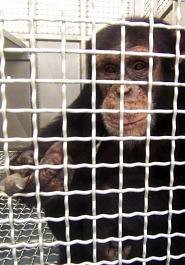Veterinary Support Needed to Help Chimpanzees in Laboratories
Join Almost 1,000 Scientists in Opposing Use in Invasive Research
November 5, 2012
 A 2008 undercover investigation at a research laboratory revealed the anxiety and misery chimpanzees are forced to endure behind closed doors. The HSUSEarlier this fall, the National Institutes of Health announced that 110 chimpanzees at the New Iberia Research Center in Louisiana—the site of a 2008 undercover investigation by The Humane Society of the United States exposing poor treatment of the animals—would be moved to alternate locations and declared "permanently ineligible" for research.
Since this announcement affects 20 percent of the federally-owned population of chimpanzees, it was welcome news as well as a reflection of the fact that the world is moving towards a time when chimpanzees will no longer be used in invasive research.
However, your support is needed to ensure that this transition happens as expeditiously as possible. The Humane Society Veterinary Medical Association believes there are several reasons why the veterinary community should step forward in support of ending the use of all chimpanzees in harmful research and providing them permanent, high-quality sanctuary, including:
Science
An Institute of Medicine committee released a study in December 2011 that found chimpanzees are "largely unnecessary" for biomedical and behavioral research. Further, the committee could not identify any area of current biomedical research for which chimpanzee use is essential, and predicted a continued downward trajectory of chimpanzee use owing to increasingly available alternatives. And, in addition to the announcement mentioned above, NIH has halted any new funding of chimpanzee research while they work to implement these findings.
Ethics
Chimpanzees are our closest living relatives and research has shown that they have complex social and emotional lives. Given their capacity to suffer, laboratory life can be extremely difficult for chimpanzees. This has been documented by The HSUS undercover investigation at the New Iberia Research Center—the largest chimpanzee laboratory in the world—and by recent academic papers describing the negative, long-term effects of laboratory life on chimpanzees. Chimpanzees should be cared for at a sanctuary devoted entirely to their well-being rather than a laboratory whose objectives do not allow prioritization of their needs.
Economics
It is more expensive to maintain chimpanzees in laboratories than to care for them in sanctuaries, due mostly to differences in overhead costs and institutional goals. It is simply unwise to invest limited research dollars in maintaining a population of chimpanzees in laboratories, particularly given that chimpanzee research is unnecessary and ethically problematic.
All of these points taken together demonstrate that it is time to end the use of chimpanzees in harmful research and focus limited research dollars on more valid, ethical and cost-effective research methods. To that end, HSVMA is joining with The HSUS in seeking endorsements from scientists, academics, and health professionals to demonstrate to policymakers and others that there is support by these key groups for ending harmful research on great apes and providing them suitable and permanent sanctuary.
Please join the almost 1,000 scientists, academics and health professionals who have already endorsed the following statement regarding the use of chimpanzees for invasive research and testing in the United States:
We, the undersigned members of the scientific, academic and health professional communities, support efforts to end the use of chimpanzees for biomedical research and testing in the United States and to provide them permanent sanctuary.
If you agree to the above statement and would like to sign on in support, please visit humanesociety.org/supportchimps and submit your information. Our goal is to reach the 1,000 signature mark, at which point the statement and endorsement list will be released to the public to build support for this initiative.
If you have questions about the above petition, please contact HSVMA at [email protected].
|